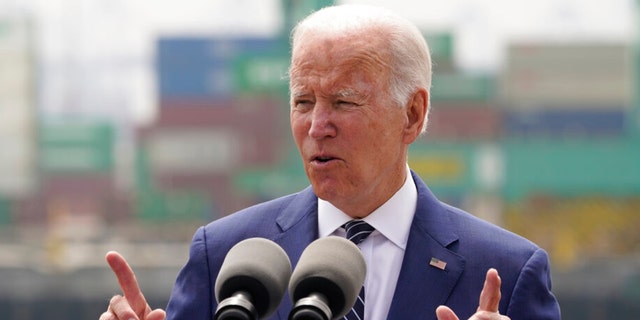
As President Biden touts the state of the U.S. economy under his stewardship, a striking number of Americans with auto loans are struggling to make their monthly payments.
The juxtaposition between Biden’s rhetoric and the harsh economic realities for many people highlights what’s become a constant thorn in the president’s side: high inflation, which continues to eat away at household income, and public opinion disapproving of his handling of the economy.
Car loans are the latest sign of such economic problems. Indeed, loans delinquent by more than two months increased by 5.3% in December compared to the prior month and skyrocketed by 26.7% from a year ago, according to recently released data from Cox Automotive.
Of all December loans, 1.84% were severely delinquent (generally defined as more than 90 days behind on payments), marking an increase from 1.74% in November and the highest rate since February 2009, when the financial crisis crippled the the U.S. economy.
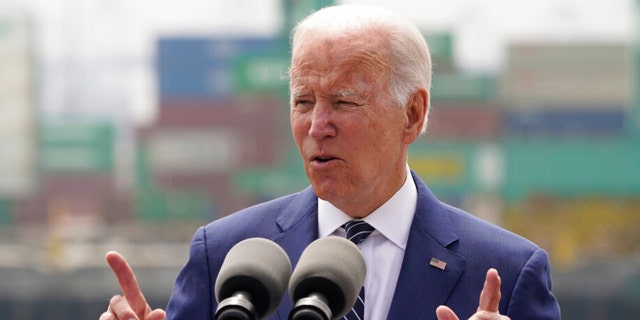
President Biden speaks about inflation and supply chain issues in Los Angeles. (AP Photo/Damian Dovarganes)
People with low credit scores and poor credit histories — those who received subprime auto loans — were especially behind on payments.
“In December, 7.11% of subprime loans were severely delinquent, increasing from 6.75% the prior month,” Cox Automotive reported. “The subprime severe delinquency rate was 163 basis points higher than a year ago, and the December rate was the highest in the data series back to 2006.”
Despite more people missing loan payments, however, defaults on loans have yet to experience a similar surge. Auto lenders generally don’t consider the borrower to be in default until they’re 90 to 120 days late of insufficient payments, indicating a potential surge in defaults in the coming months.
New figures showing people not making their car payments come as Americans are living paycheck to paycheck and not being able to afford basic necessities.
About 72% of middle-income families say their earnings are falling behind the cost of living, according to a quarterly survey from Primeric report. A similar number, 74%, said they’re unable to save for their future. Both figures are up from a year ago.
Prices continue to remain high due to inflation, which reached a four-decade high last summer but has slowed over the last six months.
According to the latest data, consumer inflation in December increased by 6.5% compared to the same time a year ago — the smallest 12-month increase since October 2021. Meanwhile, the inflation rate for producers in December rose 6.2% over the previous 12 months, the lowest level since March 2021.
“As inflation is coming down, take-home pay for workers is going up,” Biden said in remarks on the economy earlier this month. “Workers’ wages are higher now than they were seven months ago, adjusted for inflation. Wages for lower-income and middle-income workers have gone up even more. It all adds up to a real break for consumers, real breathing room for families, and more proof that my economic plan is working.”
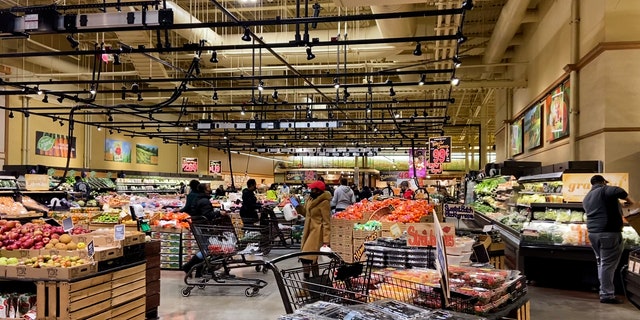
Grocery store shoppers in a Washington, D.C. suburb (Fox News Digital)
However, while inflation is slowing, the most basic and fundamental costs of living — food and housing — have spiked. Grocery prices are up 11.8% year-over-year, while shelter costs are up 7.5% from a year ago.
Despite Biden’s comments, inflation has outpaced raw worker wages, which have consistently increased over the past two years under Biden. But when accounting for inflation, real average weekly earnings plummeted from December 2021 to last month by 3.1%, according to the Labor Department. Over the entirety of Biden’s presidency, wages have cumulatively risen by 10% while inflation has risen cumulatively by 14%.
Experts, including Rachel Greszler, a senior research fellow at the Heritage Foundation, calculate that this mismatch has cost the average household thousands of dollars.
“The Biden administration continues to tout high job gains throughout its tenure but fails to mention the large decline in workers’ inflation-adjusted wages and the millions of Americans that are no longer working,” Greszler wrote. “Since January 2021, workers have lost $3,300 in wages due to inflation’s $7,200 tax that has outstripped workers’ $3,900 nominal wage gains.”
As costs for necessities increase and households have less purchasing power, many Americans are forced to make tough choices.
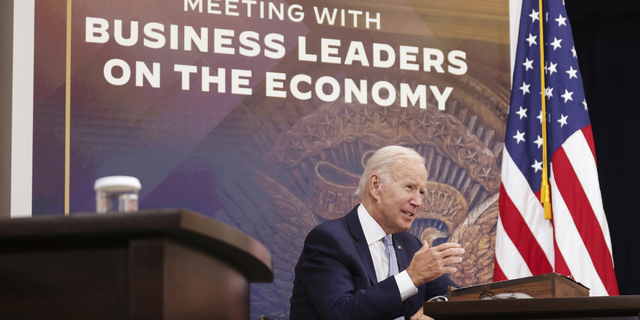
US President Joe Biden speaks in the Eisenhower Executive Office Building in Washington, D.C., US, on Thursday, July 28, 2022. The drumbeat of recession grew louder after the US economy shrank for a second straight quarter, as decades-high inflation undercut consumer spending and Federal Reserve interest-rate hikes stymied businesses and housing. (Photographer: Oliver Contreras/Bloomberg via Getty Images)
Nearly one in five Americans (18%) said they skipped meals or didn’t buy groceries due to high inflation over the past year, according to a Nationwide Retirement Institute survey. The data also showed that, due to inflation, many people canceled or postponed health plans in the past 12 months to see a specialist (14%), take a prescribed medication (10%), or get an annual physical (11%).
Meanwhile, the data found 10% of adults have diverted funds from retirement savings to pay for health care expenses, and another 14% are considering doing so this year. Among Gen Z and Millennials, this figure is 21% and 20%, respectively.
Still, Biden has touted the economy’s performance, crediting his administration’s policies for helping working and middle-class Americans.
“Now, two years in, it’s clearer than ever that our plan is working. We’re building the economy from the bottom up and the middle out. Not just the top down,” Biden said at the Conference of Mayors Winter Meeting over the weekend. “Because when we do that, by the way, the wealthy do very, very well. And everybody — the poor have a shot, and the middle class can have a little breathing room. An economy that benefits the folks in the Heartland as well as in our cities and all across America.”
Biden has also recently said the economy is headed to a “new plateau” and on a “winning streak,” despite fears of a looming recession.
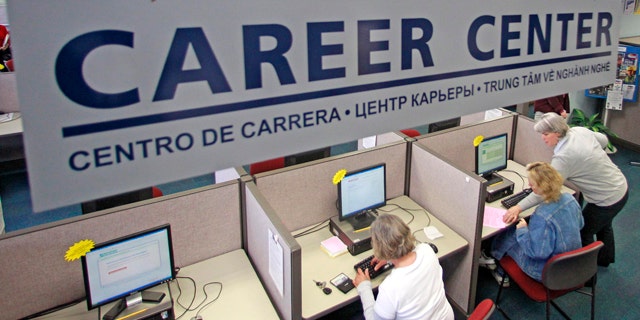
May 17: Job searches use computers to search for jobs at WorkSource Oregon, in Tualatin, Ore. (AP)
White House press secretary Karine Jean-Pierre has echoed these points, telling reports last week that Biden’s policies over the past two years led to a “historic recovery” following the COVID-19 pandemic and what Biden has termed “stable and steady” economic growth.
So too has Treasury Secretary Janet Yellin, who penned an op-ed for the Wall Street Journal last month making similar arguments. “The policies of the Biden administration have propelled the American economy to one of the fastest recoveries in modern history,” she wrote. “Because of President Biden’s plan, we have improved the economic well-being of American families and workers and strengthened the economy’s resilience in the face of significant global headwinds.”
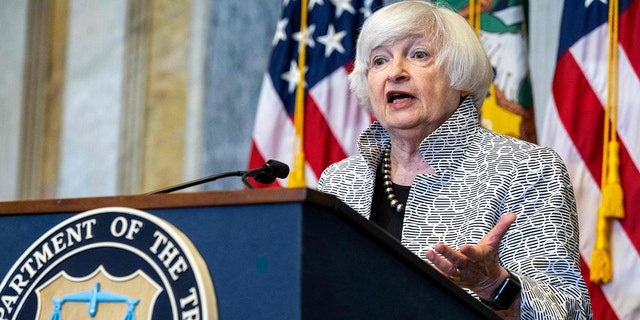
US Treasury Secretary Janet Yellen speaks on the state of the US economy during a press conference at the Department of Treasury in Washington, DC, July 28, 2022. – Yellen said Thursday it will be possible to bring down high inflation without triggering a big increase in joblessness. (SAUL LOEB/AFP via Getty Images)
The American people don’t seem to be buying such arguments, however.
For several months, polling has consistently shown a majority of Americans disapprove of Biden’s handling of inflation and the overall economy more broadly.
A new ABC News/Ipsos poll, for example, shows just 31% of the country approves of his handling of inflation and only 38% likes how he’s tackled the economy.
Such disapproval fits with an overall pessimism about upward economic mobility found in recent polls.
CLICK HERE TO GET THE FOX NEWS APP
Gallup, which tracks Americans’ views of the next generation’s likelihood of surpassing their parents’ living standards, found in a recent survey that hope for the American dream is at an all-time low.
According to the data, 59% of middle-income Americans — defined as making between $40,000 and $100,000 — said it’s very or somewhat unlikely that today’s young adults will have a better life than their parents. Of those with annual household incomes under $40,000, 48% similarly said it’s unlikely today’s kids will have better lives than their parents.








